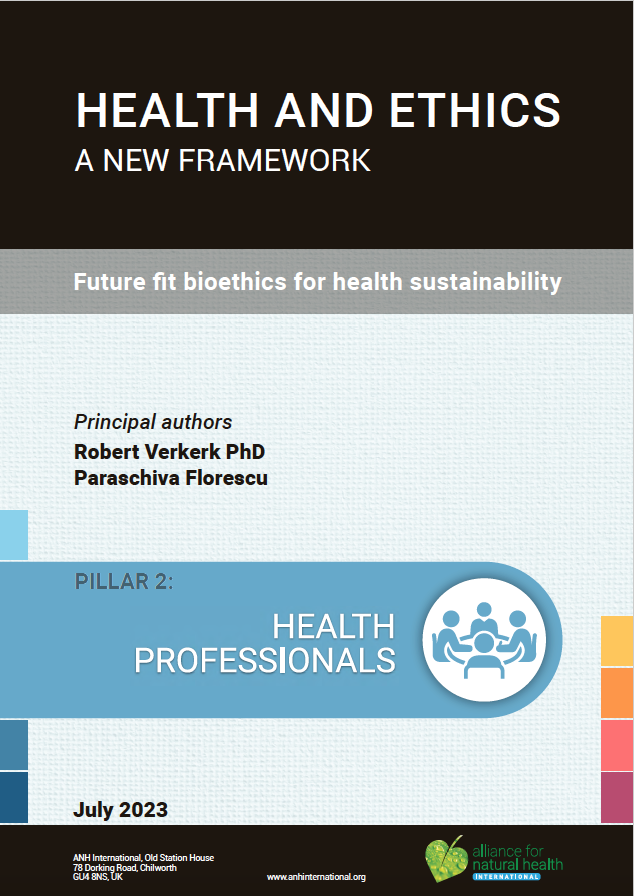Content Sections
Medical ethics appears to have been put on the back burner in recent times and coercive medical procedures, lack of properly informed consent and breaches of respect for autonomy of individuals have become commonplace. These challenges triggered our interest in re-creating a framework for medical ethics, taking the best of modern ethical principles, as well as the the best from traditional, and even ancient systems. Last month, we released the first of eight pillars of our Health and Ethics Framework, dealing with the relationship between doctors and other health professionals and their patients or clients. It is one of the most important relationships in healthcare - and because the relationship, not just the interventions that might be prescribed, has therapeutic value in itself, it is sometimes referred to as the ‘therapeutic relationship’.
Today, we release the second pillar, specifically dealing with ethics that relate to Health Professionals.
Eight ethical principles relevant to health professionals
The eight overarching principles we’ve developed for this second pillar, aim to ensure that health professionals themselves are cared for, and subscribe to principles that help build trust, and, in turn, ensure they are able to be of optimal service to others in ways that really meet their patients' or clients' needs.
The 8 headline principles are listed below; and you’ll find the full details about them in the Pillar 2 framework document (see below).
- Self-care
- Continuous education
- Collaboration with other health professionals
- Health creation and regeneration
- Avoiding over-diagnosis and over-treatment
- Sustainable practice
- Professionalism
- Reporting malpractice, injustice and corruption
At ANH, we know that the majority of our supporters and subscribers are either members of the public with a very keen interest in health, especially natural health - while a significant number are also health professionals.
>>> Download ANH's full report on Pillar 2: Health Professionals: A New Framework (2023). Principal authors: Verkerk R, Florescu P. Alliance for Natural Health International.
>>> Download ANH's full report on ethics relating to Health Professionals (Pillar 2): Health Professionals: A New Framework (2023). Principal authors: Verkerk R, Florescu P. Alliance for Natural Health International.
From principles to propositions
The eight principles with their respective propositions for an ethical code for health professionals are given below:
- SELF-CARE: Healthcare Professionals will take care of their own health from a holistic perspective; maintain a high standard of health and resilience through managing life’s demands and optimising their health and resilience. They will also recognise early signs of declining physical and psychological health so they can restore their health and vitality.
- CONTINUOUS EDUCATION: Healthcare Professionals will ensure that they continually develop their professional skills, knowledge and behaviour in order to keep pace with developments and improve the standard of care offered to patients or clients within their scope of expertise.
- COLLABORATION: Health professionals from a diverse range of expertise shall work together, encouraging multi-, inter- and/or trans-disciplinary collaboration. Other health professionals will be treated with respect. Help and guidance from, as well as support to, other health professionals, will be offered where and when required.
- HEALTH CREATION AND REGENERATION: Practices will be based on supporting and enhancing the creation, maintenance and regeneration of the functional health status, wellbeing and resilience of patients or clients.
- AVOIDING OVER-DIAGNOSIS AND OVER-TREATMENT: Healthcare Professionals will always strive to offer or recommend diagnostics or treatments, based on their clinical judgement and other forms of evidence, that are most likely to offer the greatest benefit (beneficence), while minimising any risk (maleficence). Care will be taken that the health status of clients or patients is not compromised by over-diagnosis or over-treatment.
- SUSTAINABLE PRACTICE: Practices should be run in a way that is sustainable, and therefore will be sensitive and responsive to the needs of all patients or clients, respecting the intrinsic link between human, environmental and planetary health.
- PROFESSIONALISM: Health Professionals will observe explicit standards and ethical codes while maintaining respectable and high standards of professionalism in terms of their dealings with patients or clients, other health professionals, or any other person associated with their services.
- REPORTING MALPRACTICE, INJUSTICE AND CORRUPTION: While endeavouring to maintain a positive and cooperative relationship with other health professionals and the wider community, Health Professionals will also undertake to report to relevant individuals or authorities any evidence of injustice, malpractice, dishonesty, fraud or corruption, whether instigated by individuals, organisations, or companies. While being sensitive to individual circumstances, they will also stand up against any degradation of the ethical principles that should underpin a just, progressive, effective and trustworthy system of health and care.
>>> For more information and an explanation of each proposition, download ANH's full report on ethics relating to Health Professionals (Pillar 2): Health Professionals: A New Framework (2023). Principal authors: Verkerk R, Florescu P. Alliance for Natural Health International.
>>> If you’re not already signed up for the ANH International weekly newsletter, sign up for free now using the SUBSCRIBE button at the top of our website – or better still – become a Pathfinder member and join the ANH-Intl tribe to enjoy benefits unique to our members.
>> Feel free to republish - just follow our Alliance for Natural Health International Re-publishing Guidelines
>>> Return to ANH International homepage









Comments
your voice counts
There are currently no comments on this post.
Your voice counts
We welcome your comments and are very interested in your point of view, but we ask that you keep them relevant to the article, that they be civil and without commercial links. All comments are moderated prior to being published. We reserve the right to edit or not publish comments that we consider abusive or offensive.
There is extra content here from a third party provider. You will be unable to see this content unless you agree to allow Content Cookies. Cookie Preferences